It still makes me cringe with sadness to think about losing my honeybee colony. This video was taken at the beginning of our journey. I lost them in February, and up until January, my colony seemed to be doing fine. We nearly made it to our one year anniversary of teaming up. I say teaming up, because I gave them a home when they were orphaned, or searching for a new home, last June. They were a swarm, and they were my first rescue ever, and it was an incredible experience. One I will surely repeat many times more.
I planted double the flowers in my front and back yards, upon the arrival of my rescued swarm. My yards were already filled with native bee species, and to add thousands more bees without planting more flowers, would mean to starve my existing residents. My yard was gorgeous from spring to the end of fall, and buzzing with all kinds of delightful insects and birds. It was bliss to a bee-hugger like me.
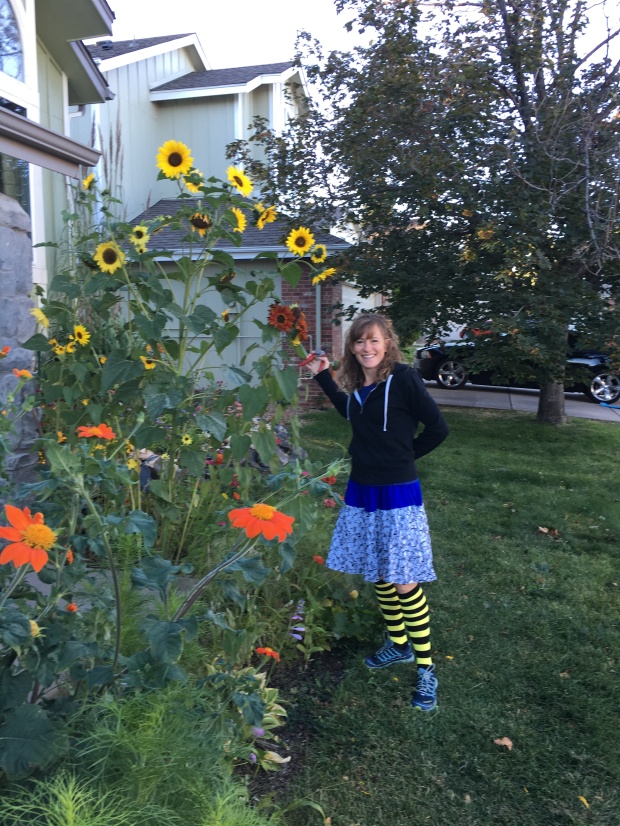
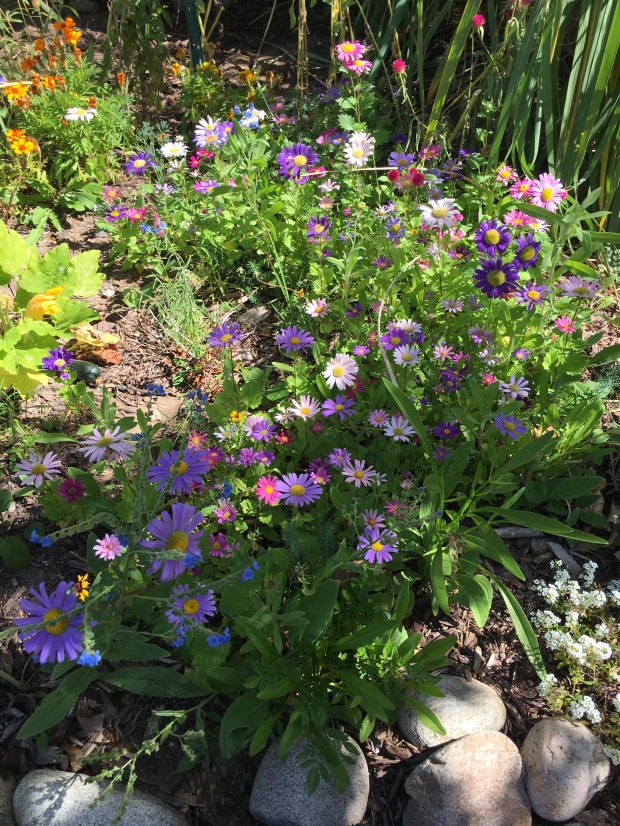
I know my honeybees were in heaven too, because I found pure gold inside the hive just before the chill hit. They had been very active in my flowerful yard, as well as miles away in the open spaces where many native flowers were blooming.
I had also rescued two small bumblebee colonies who were unwanted in their chosen estates. The results were amazing! Tomatillos were so plentiful that many of them never grew larger than the size of a grape tomato; there wasn’t a branch without fruit on those plants! I had food coming off the many garden vines all the way into late October! All of my bees, native and honey, were thriving and helping my garden thrive too.
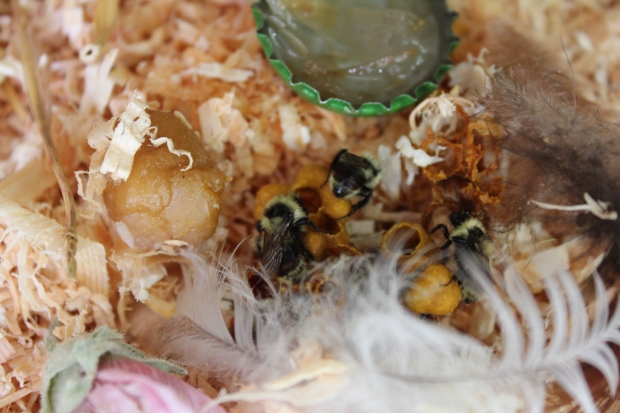
This colony was in a chicken coop! Chickens killed their queen, but they went on living all summer.
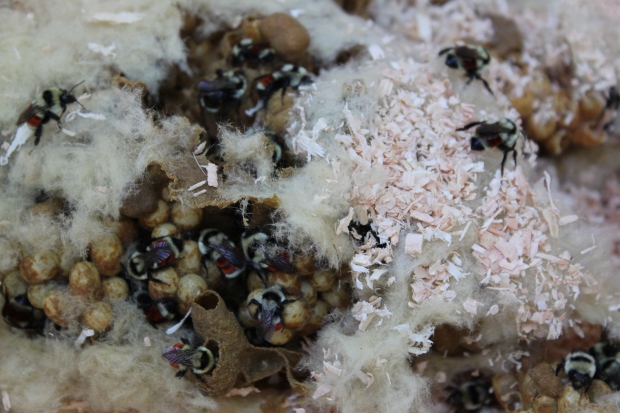
This colony was living in the crawl space of a town house, and many were flying into the house, dying by the dozens, because they were confused. Once relocated to my yard, they thrived, and gave me much to be grateful for in my veggie garden!
Native bees die off at the end of fall, and queens, as well as cocooned adults, go into hibernation for the winter, but honeybees overwinter, so I watched them very carefully, as it was our first winter together. They were doing famously until January, which is when I began to see bees doing strange things on my patio below the deck where my hive sits. At first, I didn’t think anything of it, because bees die, and some of this behavior might be normal, but the number of deaths was increasing, and at the end it was by the thousands, as if a plague had hit the hive.
The bees had a Parkinson’s like tremor when they walked, and often failed to launch into the air to fly, as if the nervous system was compromised. I looked for mites, but to no alarming avail, were they present. I would see one bee with a mite, out of thousands of bees with no mites. So, I concluded it wasn’t a “mite” problem, but their presence never helps when it comes to fighting disease, as they are very good vectors, as mosquitos are for humans.
As I was searching for answers, the populations continued to drop, and then the day I found the queen came, and I knew it was over for my honeybee colony.
I opened the hive to inspect on a warm day in February, and there she lay, at the very top of the hive, on her side, barely clinging to life. She too had the Parkinson tremor, paralytic movement, and shear weakness, with no workers surrounding her. My heart sank.
As I ventured deeper into the hive, I found the workers clustered in a very small ball; their numbers down to the hundreds. My heart sank twice more. I was witnessing the death of my hive.
I carried the queen to her workers, but they were too confused to acknowledge her, so I took some of their honeycomb and put it in the top, where I found her, and soon workers flew over. That’s when they realized who she was, and the events that followed were surreal. I watched them see her to the other side, gently caressing her and surrounding her weak body. I thought this day was sad for me, but this must have been devastating to the honeybees.

When a queen dies, the honeybees lose the order of the kingdom, and don’t know what to do without her. Her tireless dedication to laying eggs for her colony is lost once she is gone, as she is the only fertile female capable of laying both male and female eggs.
When she is alive and present, the queen’s pheromones suppress the development of the worker bee’s ovaries, making her infertile, so the worker can only lay male eggs, as these are haploid, requiring no mating to exist. A hive full of males would only be good for another hive full of new queens ready to mate. The point is, the queen is irreplaceable, and the loss of her will result in the loss of the colony, unless you are able to acquire another queen to replace her, which I could not do in the middle of winter. The timing of it all was so very unfortunate, and outside of my control.
I believe the cause of this loss was Chronic Bee Paralysis Virus (CBPV) Type 1, and my conclusion is only based on the symptoms I was seeing with my bees: trembling motion of wings and bodies, unable to fly, and dysentery. Disease transmission occurs via bodily contact through open wounds. Winter requires honeybees to pack in close together to generate heat, and bees generally do not leave the hive during the winter months, unless the days get warm. So, the conditions were perfect for the virus to take hold.
The infection reached a tipping point in February, and at the end, bees were dropping by the thousands! It was swift, shocking, and nauseating. I felt awful, and helpless. Viral infections are without recommended treatments, so bees are at the will of their immune systems, as is the case with viral infections in humans.
This situation is like hundreds of us living inside an airplane for several months, that contains all the provisions we need to survive, but one person boards the plain with a deadly viral infection that will spread to everyone on that plane, just by touch, because we are all stuck inside of it for months. People would be fine for a short while, yielding only a few deaths, but as the virus spreads to more individuals, people begin to drop by the dozens, and eventually no one would remain. This is what happened to my colony.
After that day, I left my empty hive alone for a week. All my bees died or left days after the queen. I couldn’t look at it. I was angry with myself, but really, I had no control over what had happened. I realized I had bring my focus to the bright side, if there was such a thing in this experience.
At the end of the week I opened up the hive to clean it all out, and found loads of honey! I could definitely say my bees had been well fed, and that adding double the flowers paid off in big ways. I harvested the honey, and the wax for the first time ever, and enjoyed every minute of it, well most of it. The wax harvest was most challenging to me, but now I have it down, so when I have the opportunity to harvest in the future, I will be prepared.
In the end I harvested 34, 8 oz jars of honey! WOW! This was from a total of 8 frames, two of which were only half filled with honey comb. And the taste of this honey is unlike anything I’ve purchased at the store. The depth of the flavor is incredible, and really tasted like flowers. I think I might be a bit possessive of my honey, because of where it came from, because my husband wants to give it away to people, but I find myself snapping back, “NO!” What have I become, a honey miser?
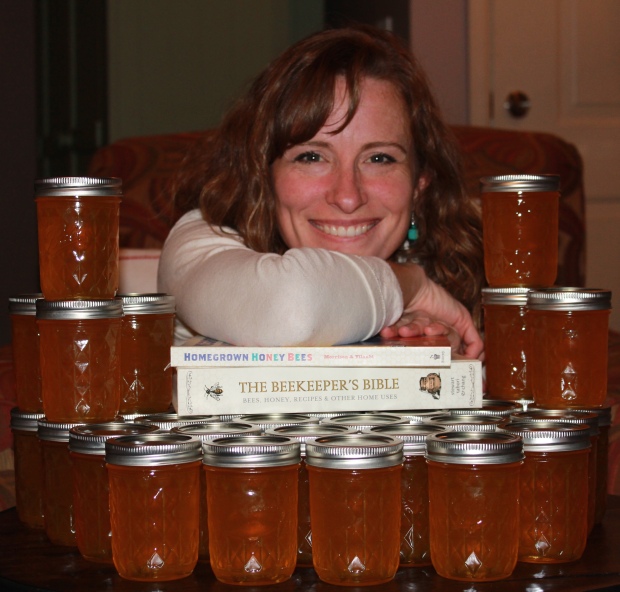
I’m attached to the honey that came from my first honeybee colony, which died, and when it died, it felt like a death in the family…okay, not quite that devastating, but pretty close.
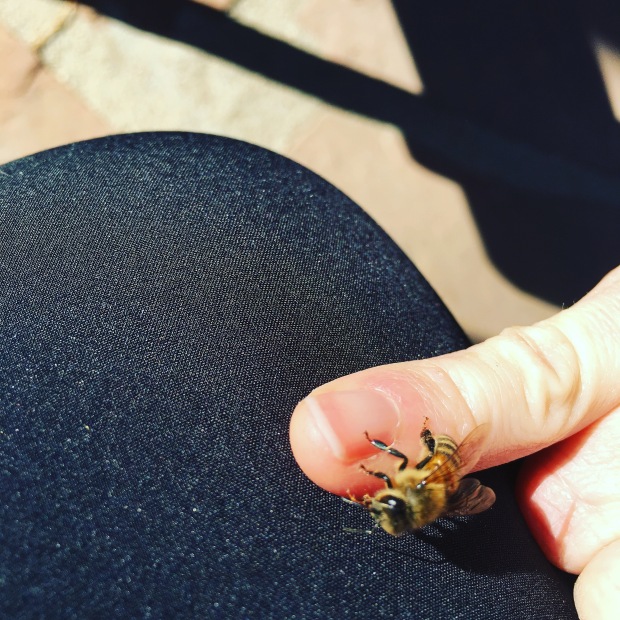
They were my pets. I truly cared for them, and their presence made me happy. Listening to them buzz around their hive; watching them bee-line in and out, was entertaining to me. Opening the hive for inspection was exhilarating, and interacting with them was, as strange as it may seem to an outsider, spiritual. I realized in my journey with honeybees, that they have and show emotional intelligence. They knew me, and trusted me. It was something special, so this honey is a special reminder of that relationship; it’s a memorial of my first journey with honeybees. So, giving it away means something.
This was my first journey, not my last, with honeybees. It is my hope to adopt another swarm this season, and it is my hope that we will do better the second time around. I’ll plant even more flowers, and welcome another colony into my backyard. I think I might bee hooked! Help the bees that live in or near your yard by planting more pesticide free flowers this spring…it’s the simplest, most effective way to save the bees.
Thank you for joining the movement.
Jessica

So so sorry for your lose! What devastation but you will raise many many more bees in the future.
LikeLiked by 1 person
Thank you Donna. I do hope to raise many more bees in my lifetime!
LikeLike